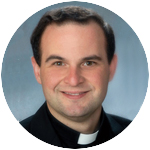
Father Eric J. Banecker
The great unraveling. The great reset. The era of change. These and similar sentiments have been attached to the age we are currently living through. Calling it the “age of covid” is not quite right, of course. While the coronavirus is obviously the central news story of our time, it is actually just an accelerant – fuel for the fire, so to speak – of the rapid societal changes that have been underway for quite some time now.
In just the past few weeks, I have heard of several families selling their homes and moving to a new location – sometimes quite far away! People are starting new businesses and are developing new habits.
Some families I know have decided to start homeschooling their children. Others are discussing abandoning the public school system for private or parochial schools. Many couples who previously accepted the reality of daycare without question are finding that being home more presents new possibilities to dedicate more time to raising children.
[hotblock]
Others are finding that all the time spent at home has been enjoyable – and have sought larger homes in more wide-open spaces as a result. Professional journalists and public figures are shying away from traditional media outlets (even traditional social media!) for direct content sharing on Substack, Locals, and other places. In short, it’s an era to try new things.
And that is a very good thing. Because the last year has demonstrated what sociologists have been telling us for a long time: just about every major institution in American life is distrusted by large percentages of the population. Not everyone distrusts everything, but it seems everything is distrusted by some combination of Americans.
The media, politicians, academia, the scientific community, Hollywood, churches, public schools, unions, police – every one of those groups (and subsets of each!) have been protested, attacked, or ignored by many people in the last year.
What’s new is not the lack of trust (or the institutional failure that caused it); rather, what is new is the way we’ve all come face-to-face with it. How ironic it is that as the secular culture continues its deconstruction project, many yell about masks and walls.
All that distrust boils down to one thing: we have lost trust in each other.
In the midst of the crumbling ruins of our civilization, renewal is essential. But how do we get there? Institutions – whether secular or religious, whether large or small – are difficult to change. That’s not a design flaw: they are supposed to be able to survive different eras of societal change. But that means that we cannot rely on them to renew themselves.
What is required is building new institutions that have as a primary goal the strengthening of the bonds of friendship and solidarity. Truly great organizations – whether schools or universities, whether town councils or book clubs – pursue some shared good among fellow travelers.
As Catholics, we know that pursuit of the one who is Truth and Goodness itself lies at the center of everything. And the truest kind of friendship – the kind that leads to bonds unbreakable both now and in eternity – is forged among men and women for whom this pursuit means everything.
In our parishes and schools, in our religious education programs and service organizations, in the new movements and in venerable religious communities, everything must be directed toward re-establishing the bonds which have been weakened by mediocrity, scandal and the corrosive comforts of bourgeoise secularity.
Those using this age to pick up roots should be able to put them down and find joy and purpose in the flock of Christ. While on paper it may be smaller in this part of the world than in the past, it is no less that holy people formed from the side of Christ on the cross and the sacrament by which men and women are saved. It is there – and not in the world or its fleeting joys – that we find true rootedness and peace.
In this time of Lent – the season of change par excellence – may each of us embrace Christ’s call to conversion so that others may find in us something – and Someone – to trust.
***
Father Eric J. Banecker is parochial administrator of St. Francis de Sales Parish, Philadelphia.
PREVIOUS: In year of COVID, a change of era and perhaps growth
NEXT: Look to St. Joseph to deal with our much-changed world



Share this story